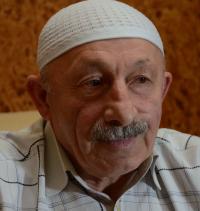Nothing like this could have happened during Soviet times
Temelan Safkujev was born in 1950 in North Ossetia in the Muslim village of Jeseten. He studied history at a university where he also met his wife. They got married when he was twenty-two. He worked in a warehouse and although it wasn‘t related to his studies he liked his job because it provided him with enough free time for his own garden work. In 1974 his daughter Inga was born, who later fell victim to the Beslan school siege. Temelan has three other children: sons Timur and Azamat and daughter Fatima. Inga got married and moved to Beslan. She and her husband lived near school No. 1. On 1 September 2004 Temelan‘s first grandson was about to go to school for the first time and he as a grandfather wanted to be present. He felt sick in the morning so instead he went to the clinic. Here he learned from the physician what had happened in the school. He went there straight away. There were thousands of people in the streets around and the information they received was incomplete. The official channels claimed that there were some 350 people inside the school but the relatives were certain that the number of hostages was several times higher. Already in the evening of 1 September Temelan Safkujev learned from his neighbors that his son-in-law was shot and thrown out of the window by the terrorists. On the third day as they started transporting the wounded to hospitals he began searching for his daughter and grandson. It took him over a month. In October he underwent a DNA test based on which both of their bodies were identified. Later he learned from acquaintances that at the moment when she found out that they shot her husband, his daughter lost it and began rebuking the terrorists and protecting other people who were done harm to. Temelan Safkujev is nostalgic in recalling the Soviet times. He blames the Ingush people for terrorist attacks of the past fifteen years. Furthermore he blames the security forces for the Beslan tragedy, since they were shooting at the school even though the hostages were still inside. He also blames the local police who instead of taking immediate action first fortified themselves in their office because they feared they would also be targeted by the attack. His daughter‘s death left behind two orphans who are taken care of by their old grandma from their father‘s side.
